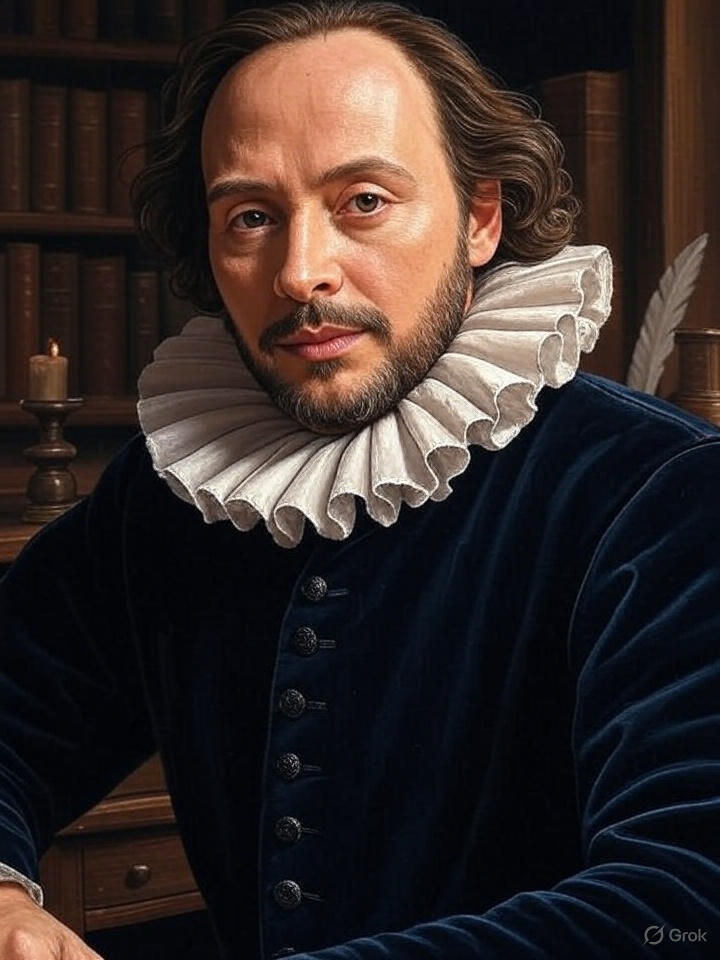Who is the Shakespeare of Italian, Spanish, French, German and Portuguese?
- Edoardo Ceron
- Sep 21
- 4 min read

In the shadowed halls of literary history, one name burns brighter than most: William Shakespeare. His quill conjured worlds—tragedies that pierce the soul, comedies that dance with wit, and histories that pulse with the heartbeat of humanity. But what makes Shakespeare the gold standard of literary genius? And who are his counterparts in other tongues—Spanish, Italian, German, French, and Portuguese—whose pens wielded similar magic? This exploration unveils the literary titans who shaped their languages as profoundly as Shakespeare shaped English. From Dante’s descent into the inferno to Goethe’s pact with the devil, let’s meet these giants in the order of their birth, discovering the stories that defined them and the timeless words that connect us all.
Dante Alighieri: The Italian Shakespeare (1265–1321)
Born in the bustling city-state of Florence during the Middle Ages, Dante Alighieri crafted a masterpiece that mapped the human soul’s eternal quest. In The Divine Comedy, a poet named Dante finds himself lost in a dark forest at midlife, symbolizing sin and confusion. Guided by the Roman poet Virgil, he descends through the nine circles of Hell, witnessing the torments of the damned—from traitors frozen in ice to the lustful whipped by storms. Ascending Mount Purgatory, he purges his own flaws, finally entering Paradise with his beloved Beatrice as guide, beholding the divine light of God. This epic journey, blending allegory, theology, and vivid imagery, not only navigated the afterlife but standardized Italian from a patchwork of dialects into a unified literary language.

"Quanto la cosa è più perfetta, più senta il bene, e così la doglienza."
"The more a thing is perfect, the more it feels pleasure and pain."
Dante’s verse, with its intricate terza rima rhyme scheme, elevated Italian to poetic heights, influencing generations and embedding moral reflections into the language’s core.
Luís de Camões: The Portuguese Shakespeare (1524–1580)
Amid the salty sprays of the Atlantic, Luís de Camões captured the spirit of discovery in an epic that sailed Portugal to literary immortality. In The Lusiads, the Portuguese explorer Vasco da Gama sets sail from Lisbon in 1497, braving treacherous seas and mythical perils to reach India. Guided by gods like Venus and challenged by Bacchus, the crew faces storms, battles, and exotic encounters, symbolizing Portugal’s Age of Exploration. The poem celebrates heroic deeds while pondering fate, blending classical mythology with real historical voyages.

"O mar e a terra, o homem e os animais E as plantas, tudo enfim quanto há na vida Sente o rigor do tempo e dos mortais."
"The sea and the land, man and animals, and plants, everything in life feels the rigor of time and mortals."
Camões’ ottava rima stanzas standardized Portuguese, infusing it with epic grandeur and ensuring its spread across colonies in Brazil, Africa, and Asia, much as Shakespeare’s iambic pentameter defined English rhythm.
Miguel de Cervantes: The Spanish Shakespeare (1547–1616)
In the dusty plains of La Mancha, a quixotic dreamer embarks on a quest that blurs madness and nobility. In Don Quixote, an aging gentleman, inspired by chivalric romances, renames himself Don Quixote and sets out with his loyal squire Sancho Panza to right wrongs. Mistaking windmills for giants and inns for castles, Quixote’s adventures expose the clash between ideal and reality, filled with humorous mishaps, profound reflections, and encounters with scheming dukes and lovesick shepherds. The tale culminates in Quixote’s poignant return to sanity, questioning the value of dreams.

"El que lee mucho y anda mucho, ve mucho y sabe mucho."
"He who reads much and walks much, sees much and knows much."
Cervantes revolutionized Spanish prose, pioneering the modern novel and enriching the language with idioms and satire that echo through Hispanic literature to this day.
Molière: The French Shakespeare (1622–1673)
On the gilded stages of 17th-century Paris, a cunning impostor weaves a web of deceit that exposes societal follies. In Tartuffe, the pious hypocrite Tartuffe infiltrates the household of the gullible Orgon, feigning devotion to swindle his wealth and seduce his wife. As Tartuffe’s mask slips—through eavesdropped confessions and failed seductions—Orgon’s family unites to unmask him, but not before the charlatan nearly destroys their fortune. The play ends with royal intervention, restoring order and mocking blind faith.

"La beauté sans esprit est comme un hameçon sans appât."
"Beauty without spirit is like a hook without bait."
Molière’s crisp, witty French dialogue sharpened the language’s precision, blending farce with critique to define French comedy and influence global theater.
Johann Wolfgang von Goethe: The German Shakespeare (1749–1832)
In a dimly lit study, a scholar’s desperation summons the devil himself. In Faust, the learned Doctor Faust, disillusioned with life’s limits, pacts with Mephistopheles for unlimited knowledge and pleasure. Their adventures span earthly indulgences—seducing Gretchen, witnessing witches’ Sabbaths—to grand visions of empire-building and land reclamation. Faust’s relentless pursuit ends in redemption through striving, as divine grace saves his soul despite the devil’s claim.

"Sobald du dir vertraust, sobald weißt du zu leben."
"The sooner you trust yourself, the sooner you know how to live."
Goethe’s philosophical verse unified German dialects, infusing the language with depth and making Faust a cornerstone of Western thought.
Why These Giants Matter?
Dante, Camões, Cervantes, Molière, and Goethe didn’t just write; they sculpted their languages into tools of universal expression. Each forged stories that probe the human condition, standardizing and enriching their tongues along the way. Their words—on loneliness in lost woods, distrust in hidden malice, success through bold action—connect us across centuries.
For those discovering these titans, their tales offer timeless wisdom. Explore them, and you’ll uncover layers of meaning that speak to our shared struggles and triumphs even in our modern turbulent times.
